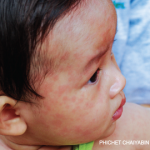The vaccines to be most aware of, because of their potential risks, are both the nasal and the intramuscular flu vaccines, shingles, hepatitis B, pneumococcal and tetanus-diphtheria-pertussis.
The conjugate pneumococcal vaccine PCV-13 is more immunogenic than Pneumovax, but how to use it in adults is a subject of debate. “It’s still a moving target,” Dr. Winthrop said. In a pivotal trial out of the Netherlands last year—in a population that was vaccine naive because no pneumococcal vaccine is routinely given in the Netherlands—the vaccine had 45.6% efficacy against vaccine-type community-acquired pneumonia.2
For those with immunocompromising conditions, such as RA, the Advisory Committee on Immunization Practices recommends giving PCV-13 followed by Pneumovax to those who have not previously received Pneumovax; giving PCV-13 to those who already have received one dose of Pneumovax, after waiting at least a year between the vaccines; and, for those already having received two doses of Pneumovax, to give PCV-13 if a year has passed since the last Pneumovax vaccination, with those under 65 eligible for one additional Pneumovax after 65.
For those over 65, a high-dose Fluzone vaccine might be called for. A 2014 study found it produced a higher level of protective titers, with similar adverse events, than the standard dose.3
For those on rituximab, a delay in flu vaccine is called for, studies suggest, because a much higher rise in titers has been seen among those who wait a longer period.
Dr. Winthrop added that he tends to wait until later in the flu season, when the risk of infection is higher epidemiologically, to give the flu shot, as long as he expects to see the patient in time to give them the shot.
“I don’t vaccinate my patients in September, I don’t even vaccinate them in October,” he said. “I vaccinate them later in the year, if I can. If I’m not going to see them again for six months or eight months, then that’s your opportunity to vaccinate, and you should do it in October. But if you know your flu epidemiology, you may want to wait.”
Herpes Zoster
As for shingles, Dr. Winthrop referred back to his 52-year-old patient, who raised a vexing timing question. She had gotten shingles six months earlier.
“I don’t know how long you need to wait before it’s really worth giving the vaccine again—there’s no right answer,” he said. But he did offer that a zoster vaccine expert, Michael Oxman of the University of California San Diego, told him that he would wait a year. So that is what Dr. Winthrop does in these cases.


